#best mvp software development in US
Explore tagged Tumblr posts
Text
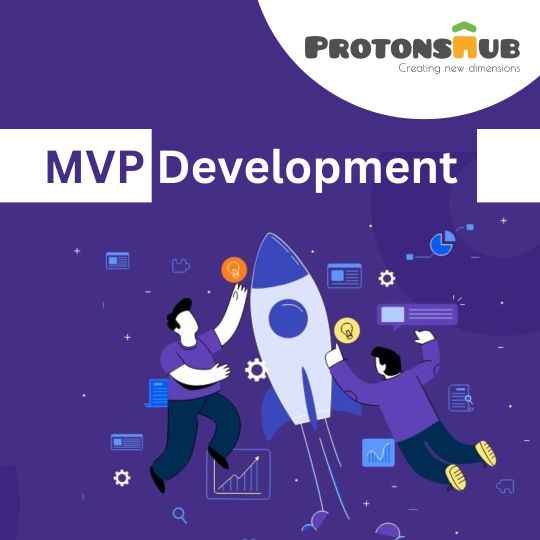
MVP Development Services | Protonshub Technologies
Get the best MVP development services. Protonshub helps you to turn your idea into a quality product with the latest features that aligns with your business goals. Contact: [email protected] to know more.
#mvp development services#mvp development company#mvp software development services#mvp development agency#mvp development company in usa#mvp development services in usa#best mvp software development in us#mvp development for startups#saas mvp development#startup mvp development company#mvp app development company#bespoke mvp development services#mvp web development#mvp software development companies#mvp in web development#mvp development solutions#mvp development#mvp development services california#mvp for startups#mvp#mvp development company usa
2 notes
·
View notes
Text
MVP Development Agency | Protonshub Technologies
As an MVP development agency Protonshub has the right expertise to provide high-quality MVP development services with implementing all kinds of client requirements. From MVP consulting, MVP improvement, market analysis and MVP prototyping they have experienced professionals that help you to get your MVP developed. Email: [email protected] to get MVP development services.
#mvp development agency#mvp development company in usa#mvp development company#mvp software development services#mvp development services#mvp development services in usa#best mvp software development in us#mvp development for startups#saas mvp development#startup mvp development company#mvp app development company#bespoke mvp development services#mvp web development#mvp software development companies#mvp in web development
0 notes
Text
MVP Development Company in USA | Protonshub Technologies
Protonshub Technologies is a leading MVP development company in the USA, specializing in creating high-quality Minimum Viable Products for startups and enterprises. With a focus on rapid development and cost-effectiveness, they prioritize user-centric design and scalability, enabling clients to test concepts efficiently and adapt based on real user feedback. Contact: [email protected] for your MVP development needs!
#mvp development company in usa#mvp development agency#mvp development company#mvp software development services#mvp development services#mvp development services in usa#best mvp software development in us#mvp development for startups#saas mvp development#startup mvp development company#mvp app development company#bespoke mvp development services#mvp web development#mvp software development companies#mvp in web development
0 notes
Text
MVP Development Company | Protonshub Technologies
At Protonshub, they are specialized in developing Minimum Viable Products (MVPs) that help startups and businesses quickly validate their ideas and enter the market with confidence. As a leading MVP development company, their expert team ensures a seamless development process, delivering the best MVPs tailored to your business needs. Contact: [email protected]
#mvp development company#mvp software development services#mvp development services#mvp development company in usa#mvp development agency#mvp development services in usa#best mvp software development in us#mvp development for startups#saas mvp development#startup mvp development company#mvp app development company#bespoke mvp development services#mvp web development#mvp software development companies#mvp in web development
0 notes
Text
MVP Development Company | Protonshub Technologies
At Protonshub they have the right expertise to provide high-quality MVP development services. From development of mvp, Improvement, Market Analysis, MVP Prototyping and MVP Consulting they offer end to end mvp services. Also at Protonshub they understand exactly what the business needs, and then figure out the best way to use technology to meet those needs. Contact: [email protected] to get a quote!
#mvp software development services#mvp development services#mvp development company in usa#mvp development company#mvp development agency#mvp development services in usa#best mvp software development in us#mvp development for startups#saas mvp development#startup mvp development company#mvp app development company#bespoke mvp development services#mvp web development#mvp software development companies#mvp in web development#mvp development solutions#mvp development#mvp#mvp development companies#mvp development agency usa#usa mvp development
0 notes
Text
MVP Software Development Services | Protonshub Technologies
Protonshub’s experts provide MVP software development services. Software development is a process of creating the basic version of a digital product to satisfy early customers. Their team of software developers offers a quick delivery and helps you to transform your ideas into a reality through a cost-effective and detailed approach. Contact: [email protected] to get your product developed.
#mvp development services#mvp development company in usa#mvp development company#mvp software development services#mvp development agency#mvp development services in usa#best mvp software development in us#mvp development for startups#saas mvp development#startup mvp development company#mvp app development company#bespoke mvp development services#mvp web development#mvp software development companies#mvp in web development#mvp development#mvp development solutions usa#mvp development company usa#mvp development california#california mvp development services#usa mvp development#mvp solutions#mvp software development
0 notes
Text
Exploring Premier Mobile App Development Companies in Texas

Texas stands as a bustling hub within the tech industry, housing a diverse array of mobile app development companies that fuel innovation and redefine the digital sphere. From Houston to Dallas and Austin to San Antonio, these mobile app development companies in Texas are at the forefront of creating transformative applications that cater to diverse industries and user needs.
The Texan Tech Landscape: A Haven for Mobile App Development
The Lone Star State's tech scene has been burgeoning, with a dynamic environment that fosters innovation. The abundance of skilled talent, supportive infrastructure, and a thriving entrepreneurial spirit make Texas an ideal breeding ground for mobile app development companies.
These companies offer a spectrum of services, ranging from ideation and design to the development, testing, and deployment of mobile applications. They cater to various platforms, including iOS, Android, and cross-platform solutions, leveraging the latest technologies to meet client requirements.
Best MVP Software Development in the US: A Crucial Element
In Texas's bustling mobile app development landscape, the pursuit of the best Minimum Viable Product (MVP) software development is paramount. MVP development forms the foundation of a successful app venture, enabling businesses to validate concepts, collect user feedback, and refine the product before its full-scale launch.
Texas-based app development companies understand the significance of a robust MVP phase. They collaborate closely with clients to create streamlined, functional prototypes that encapsulate the core features of the envisioned app. This approach enables businesses to test the market viability of their concepts and make informed decisions based on user interactions and feedback.
Leading Mobile App Development Companies in Texas
Austin Mobile App Development (Austin, TX): Known for its expertise in crafting intuitive and user-centric mobile apps, this company specializes in creating solutions that resonate with the modern user.
2. App Maisters Inc. (Houston, TX): App Maisters offers end-to-end mobile app development services, from strategy and design to development and maintenance, catering to a diverse clientele.
3. Icreon (Dallas, TX): Icreon excels in delivering scalable and innovative mobile solutions. Their comprehensive approach to development ensures that apps are not just functional but also adaptable to future needs.
4. Softeq (Austin, TX): Renowned for its proficiency in custom software and mobile app development, Softeq creates tailor-made solutions that align with business objectives.
5. Sparity Inc. (Houston, TX): Sparity specializes in creating engaging and feature-rich mobile applications, leveraging cutting-edge technologies to deliver exceptional user experiences.
6. MSTQ (Dallas, TX): MSTQ stands out for its dedication to creating scalable and secure mobile solutions. Their emphasis on quality and innovation has positioned them as a reliable partner for businesses seeking top-tier development services.
The Influence of Mobile Applications on Business Expansion
Mobile applications have become indispensable tools for businesses, serving as a gateway to reach a wider audience, improve customer engagement, and enhance brand visibility. They streamline processes, boost productivity, and offer unique opportunities for monetization and revenue generation.
The Future of Mobile App Development in Texas
As technology continues to evolve, the future of mobile app development in Texas appears promising. The amalgamation of innovative ideas, advanced technologies, and a collaborative ecosystem positions Texas as a hotspot for mobile app innovation and entrepreneurship. Understanding the significance of MVP software development in the US is pivotal for these Texas-based companies to maintain their position at the forefront of the industry.
In summary
The contribution of mobile app development firms in Texas significantly shapes the digital panorama. Their expertise, dedication to quality, and focus on user-centric solutions solidify their position as key players in the ever-evolving world of mobile applications. With a keen eye on the essence of the best MVP software development in the US, these companies continue to pave the way for businesses to transform ideas into successful, market-ready applications, propelling them towards growth and success in the digital realm.
0 notes
Text
Trusted outsource software development teams - SSTech System

Outsource software development is the practice of relinquishing software-related duties to outside singularities or organizations. Outsourcing is used by firms to acquire software services and products from outside firms that do not have direct employees or employees under contract to the business entity that is outsourcing.
Infect, the outsourcing market worldwide is projected to grow by 8.28% (2025-2029) resulting in a market volume of US$812.70bn in 2029. This model is highly versatile and suits businesses of all sizes.
Start-ups often use outsourcing to develop MVPs quickly, while established companies might seek custom software development services or AI outsourcing services to address complex challenges. Outsourcing can include working with offshore development teams, global software development partners, or local experts like Australian software development experts for specific projects.
The benefits of outsourcing software development
Outsourcing has become a cornerstone for modern businesses due to its numerous advantages. Here’s a closer look at the key benefits:
1. Cost efficiency
Perhaps the biggest incentive for sourcing solutions from outsourcing service providers is the cost cutting factor. For instance, offshore software development in India provides expertise services at comparatively lower cost than that of in-house developed services in Western countries. This efficiency enable the enactments of cost savings in some other strategic sectors of the organization.
2. Access to global talent
Outsourcing can help to discover the wealth of new talents as well as the skills of professionals from other countries. No matter Whether it’s AI and machine learning integration, web application development in Australia, or outsourced healthcare software development, businesses can find experts in virtually any domain.
3. Scalability and flexibility
Outsourcing offers flexibility that is unparalleled in many organizations today. This is because; firms are able to expand and contract particular teams depending on the specific demand in projects. For example, outsourced IT solutions help business organizations prepare for different conditions while not having to employ permanent workers.
4. Faster time-to-market
With reliable software development teams in Australia or offshore development teams in India, businesses can speed up their project timelines. This helps innovations to make it through to the market early enough, which is useful for companies.
5. Focus on core activities
By delegating tasks like software maintenance and support or cloud software development in Australia to outsourcing partners, businesses can focus on their core competencies and strategic goals.
6. Reduced risk
In-house staff and trained outsourcing partners come with best practices, methods and procedures which when implemented reduce the chances of project hitch. Working with the top-rated IT outsourcing companies in Australia gives you confidence that your project is in safe hands.
Choosing the right outsourced software development partner

In the period from 2023 to 2027, the revenue of software outsourcing is forecasted to thrive at a CAGR of 7.54%. So, outsourcing partner selection is one of the most vital components since it determines the success of a given venture. Here are essential factors to consider:
1. Technical expertise
Check the partner’s competency and his knowledge of the field. For instance, SSTech System Outsourcing offers comprehensive solutions, from AI development services in India to mobile app development outsourcing in Australia.
2. Proven track record
Look for partners with a strong portfolio and positive client testimonials. A proven track record in delivering custom software development services or managing outsourcing software development contracts is a good indicator of reliability.
3. Effective communication
Effective and open communication is extremely important if the project is to be successful. Work with people who give frequent reports and employ efficient media to overcome the differences in time areas.
4. Cultural compatibility
There has to be a cultural match or at least appreciation for each other’s customs for there to be harmony in the working relationship. As such, staffed with proficient Australia software development experts or offshore development teams, whose experience is to work on global markets can coordinate and blend well with your work culture.
5. Security and compliance
You have to make sure that your partner complies with the standards and the policies that are in the industry. This is especially substantial for all information-sensitive projects such as outsourced healthcare software development or cloud software development in Australia.
6. Scalable infrastructure
Choose a partner capable of scaling their resources and infrastructure to meet your project’s evolving needs. This is crucial for long-term collaborations, especially with global software development partners.
AI-powered tools for outsourced development teams
According to a report from the US Bureau of Labor Statistics, software development ranks among the most sought-after professions. Hence, AI is at the forefront of reshaping the outsourcing industry. Therefore, the implementation of artificial intelligence will add value to business processes, make workflow easier, and boost the results of projects. Here are some examples:
1. Automated code reviews
Tools like DeepCode and SonarQube assist outsourced teams in detecting whether errors reside in the code line or not, and whether code needs to be enriched or not. This is particularly accurate concerning AI outsourcing and in-house development industries.
2. Predictive analytics
Automated analytics tools can predict such things as the time it will take to complete the project, how much money it will cost, and what risks are possible in a software development outsourcing scenario.
3. Smart project management
Tools and platforms such as Jira and Monday.com, when empowered with AI, allow the coordination of tasks and the tracking of progress and resource allocation.
4. AI collaboration tools
Communication and collaboration with internal members and offshore software development Australia partners get facilitated through applications that include, Slack, Microsoft Teams, and zoom with integrated AI functions.
5. Natural Language Processing (NLP)
AI-powered chatbots and virtual assistants simplify communication and issue resolution, making them valuable for managing outsourced IT solutions.
Best practices for managing outsourced development teams
Outsourced teams should be mandated and coordinated following a number of recommendations to ensure the efficiency of the entirety of the outsourcing process.
Here are the best practices to ensure your project’s success:
1. Set clear objectives
Make it clear to your project team, stakeholders, and other relevant parties what the parameters of the project are, what it is that you expect out of it, and what you expect to get from it in return. This fostaines consistency between your team and the outsourcing partner to increase efficiency in service delivery.
2. Choose the right tools
Use project tracking and collaboration software approaches to track and evaluate progress and meet regular informality and collaboration targets.
3. Foster a collaborative environment
It is worthy of note that constant communication is key to ensuring that your outsourcing team is on the same page with you. Fresh produce and feedback mechanisms need to be provided in order for there to be trust as is needed in project management.
4. Draft comprehensive contracts
There should be a comprehensive outsourcing software development contract. It should address issues to do with confidentiality, ownership of ideas and concepts, plea structure and mode of handling disputes.
5. Focus on long-term relationships
Building a long-term partnership with trusted providers like SSTech System Solutions can lead to consistent quality and better project outcomes.
Conclusion
To keep up with technology, outsourcing software development offers businesses solutions and support that can enable the creation of complex solutions out of mere ideas. Outsourcing has the benefits of minute overhead cost and is also a rich source of globally talented employees, and it offers the advantage of early time to market. Whether you’re looking for mobile app development outsourcing in Australia or seeking offshore software development in India or opting for AI outsourcing services, the potential is huge.
Such companies can only benefit from opting for reliable outsourcing companies such as SSTech System Outsourcing and embracing industry best practices to promote the success of business project implementations while enhancing market relevance. As technologies like AI and cloud computing are still changing the face of the outsourcing market, software development outsourcing will still be important for any company that wants to survive in a digital world.
Take the first step today—partner with global software development partners and unlock the full potential of your ideas with the power of outsourcing.
#SSTech System Outsourcing#SSTech System Solutions#AI outsourcing services#cloud computing#offshore software development#Outsource software development#AI outsourcing#web application development in Australia#custom software development services#mobile app development#outsourced IT solutions#cloud software development#IT Support & Maintenance Services
2 notes
·
View notes
Text
histdir
So I've started a stupid-simple shell/REPL history mechanism that's more friendly to Syncthing-style cloud sync than a history file (like basically every shell and REPL do now) or a SQLite database (which is probably appropriate, and it's what Atuin does while almost single-handedly dragging CLI history UX into the 21st century):
You have a history directory.
Every history entry gets its own file.
The file name of a history entry is a hash of that history entry.
The contents of a history entry file is the history entry itself.
So that's the simple core concept around which I'm building the rest. If you just want a searchable, syncable record of everything you ever executed, well there you go. This was the smallest MVP, and I implemented that last night - a little shell script to actually create the histdir entries (entry either passed as an argument or read on stdin if there's no entry argument), and some Elisp code in my Emacs to replace Eshell's built-in history file save and load. Naturally my loaded history stopped remembering order of commands reliably, as expected, which would've been a deal-breaker problem in the long term. But the fact that it instantly plugged into Syncthing with no issues was downright blissful.
(I hate to throw shade on Atuin... Atuin is the best project in the space, I recommend checking it out, and it significantly inspired the featureset and UX of my current setup. But it's important for understanding the design choices of histdir: Atuin has multiple issues related to syncing - histdir will never have any sync issues. And that's part of what made it so blissful. I added the folder to Syncthing - no separate account, no separate keys, nothing I must never lose. In most ways, Atuin's design choice of a SQLite database is just better. That's real, proper engineering. Serious software developers all know that this is exactly the kind of thing where a database is better than a bunch of files. But one benefit you get from this file-oriented granularity is that if you just design the naming scheme right, history entries never collide/conflict in the same file. So we get robust sync, even with concurrent use, on multiple devices - basically for free, or at least amortized with the setup effort for whatever solution you're using to sync your other files (none of which could handle updates from two different devices to a single SQLite database). Deleting a history entry in histdir is an "rm"/"unlink" - in Atuin it's a whole clever engineering puzzle.)
So onto preserving order. In principle, the modification time of these files is enough for ordering: the OS already records when they were last written to, so if you sort on that, you preserve history order. I was initially going to go with this, but: it's moderately inconvenient in some programming languages, it can only handle a 1-to-1 mapping (one last-modified timestamp) even though many uses of history might prefer an n-to-1 (an entry for every time the command was called), and it requires worrying about questions like "does {sync,copy,restore-from-backup,this-programmatic-manipulation-I-quickly-scripted} preserve the timestamp correctly?"
So tonight I did what any self-respecting drank-too-much-UNIX-philosophy-coolaid developer would do: more files. In particular:
Each call of a history entry gets its own file.
The file name of a call is a timestamp.
The contents of a call file is the hash of the history entry file.
The hash is mainly serving the purpose of being a deterministic, realistically-will-never-collide-with-another-history-entry (literally other causes of collision like hackers getting into your box and overwriting your memory are certain and inevitable by comparison) identifier - in a proper database, this would just be the primary key of a table, or some internal pointer.
The timestamp files allow a simple lexical sort, which is a default provided by most languages, most libraries, and built in by default in almost everything that lists/iterates a directory. That's what I do in my latest Elisp code in my Emacs: directory-files does a lexical sort by default - it's not pretty from an algorithmic efficiency standpoint, but it makes the simplest implementation super simple. Of course, you could get reasonably more efficient if you really wanted to.
I went with the hash as contents, rather than using hardlinks or symlinks, because of programmatic introspection simplicity and portability. I'm not entirely sure if the programmatic introspection benefits are actually worth anything in practice. The biggest portability case against symlinks/hardlinks/etc is Windows (technically can do symlinks, but it's a privileged operation unless you go fiddle with OS settings), Android (can't do hardlinks at all, and symlinks can't exist in shared storage), and if you ever want to have your histdir on something like a USB stick or whatever.
Depending on the size of the hash, given that the typical lengths of history entries might be rather short, it might be better for deduplication and storage to just drop the hash files entirely, and leave only the timestamp files. But it's not necessarily so clear-cut.
Sure, the average shell command is probably shorter by a wide margin than a good hash. The stuff I type into something like a Node or Python REPL will trend a little longer than the shell commands. But now what about, say, URLs? That's also history, it's not even that different conceptually from shell/REPL history, and I haven't yet ruled out it making sense for me to reuse histdir for that.
And moreover, conceptually they achieve different goals. The entry files are things that have been in your history (and that you've decided to keep). They're more of a toolbox or repertoire - when you do a fuzzy search on history to re-run a command, duplicates just get in the way. Meanwhile, call files are a "here's what I did", more of a log than a toolbox.
And obviously this whole histdir thing is very expandable - you could have other files containing metadata. Some metadata might be the kind of thing we'd want to associate with a command run (exit status, error output, relevant state like working directory or environment variables, and so on), but other stuff might make more sense for commands themselves (for example: this command is only useful/valid on [list of hosts], so don't use it in auto-complete and fuzzy search anywhere else).
So... I think it makes sense to have history entries and calls to those entries "normalized" into their own separate files like that. But it might be overkill in practice, and the value might not materialize in practice, so that's more in the TBD I guess.
So that's where I'm at now. A very expandable template, but for now I've just replicated basic shell/REPL history, in an a very high-overhead way. A big win is great history sync almost for free, without a lot of the technical downsides or complexity (and with a little effort to set up inotify/etc watches on a histdir, I can have newly sync'ed entries go directly into my running shells/REPLs... I mean, within Emacs at least, where that kind of across-the-board malleability is accessible with a reasonably low amount of effort). Another big win is that in principle, it should be really easy to build on existing stuff in almost any language to do anything I might want to do. And the biggest win is that I can now compose those other wins with every REPL I use, so long as I can either wrap that REPL a little bit (that's how I'll start, with Emacs' comint mode), or patch the common libraries like readline to do histdir, or just write some code to translate between a traditional history file and my histdir approach.
At every step of the way, I've optimized first and foremost for easiest-to-implement and most-accessible-to-work-with decision. So far I don't regret it, and I think it'll help a lot with iteratively trying different things, and with all sorts of integration and composition that I haven't even thought of yet. But I'll undoubtedly start seeing problems as my histdirs grow - it's just a question of how soon and how bad, and if it'll be tractable to fix without totally abandoning the approach. But it's also possible that we're just at the point where personal computers and phones are powerful enough, and OS and FS optimizations are advanced enough, that the overhead will never be perceptible to me for as long as I live - after all, its history for an interface with a live human.
So... happy so far. It seems promising. Tentatively speaking, I have a better daily-driver shell history UX than I've ever had, because I now have great reliable and fast history sync across my devices, without regressions to my shell history UX (and that's saying something, since I was already very happy with zsh's vi mode, and then I was even more happy with Eshell+Eat+Consult+Evil), but I've only just implemented it and given it basic testing. And I remain very optimistic that I could trivially layer this onto basically any other REPL with minimal effort thanks to Emacs' comint mode.
3 notes
·
View notes
Text
Why Hire Dedicated Developers in India for React Native?
If you want to develop a robust mobile app efficiently, hire dedicated developers in India to turn your vision into reality. Many startups, SMEs, and enterprises struggle with high development costs, talent shortages, and slow project execution. India’s vast pool of skilled developers offers a cost-effective, scalable, and high-quality solution for React Native.
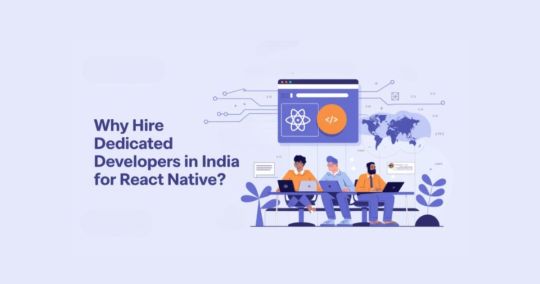
In this blog post, you’ll learn why outsourcing React Native app development to India is a game-changer, how to find and hire React Native developers, and how to maximize your investment. Let’s dive in!
Why React Native is the Preferred Choice for App Development
1. Cost-Effective Development:
Write once, deploy on both iOS & Android, reducing development time and costs.
Pre-built components and reusable code ensure faster app launches.
Optimized performance ensures smooth and seamless user experiences.
2. Perfect for Startups, SMEs, and Enterprises:
Startups: Affordable MVP development to test and validate business ideas.
SMEs: Seamless scaling and cross-platform compatibility.
Enterprises: Easy integration with existing business systems.
3. Why You Need Skilled React Native Developers:
Building a high-performing cross-platform app requires expertise in JavaScript, UI/UX design, API integration, and debugging. Without skilled developers, your app could be slow and buggy, leading to wasted resources and poor user experience.
Why Hire Dedicated Developers in India for React Native?
1. Overcome Talent Shortages with India’s Developer Pool:
India has one of the largest pools of skilled React Native developers.
Developers are experienced in cross-platform development, API integration, and app optimization.
Hire offshore developers from India with expertise in the latest mobile technologies.
2. Cut Development Costs Without Sacrificing Quality:
USA & Europe: $80–$150/hour
India: $15–$40/hour
Save up to 70% on development costs while maintaining high quality.
3. Leverage India’s Robust IT Outsourcing Ecosystem:
Access to top React Native development companies and vetted professionals.
Outsource development to India and tap into a cost-effective development team.
Work with teams that follow international coding standards and best practices.
4. Scale Your Team Faster:
Skip the lengthy hiring process in local markets.
Easily scale your remote development team in India based on project needs.
5. Enjoy a Flexible, Round-the-Clock Work Cycle:
Time zone advantage ensures real-time collaboration with US & European clients.
Indian developers work flexible hours to align with client schedules.
Key Benefits of Hiring Indian Developers for Startups & Enterprises
1. Lower Costs Without Compromising Quality:
Hiring Indian developers for startups significantly reduces operational expenses.
Startup software development teams in India follow Agile methodologies for efficiency.
2. Quick Team Expansion & Scaling:
No need for lengthy recruitment and training.
Hire in days, not months, and scale on demand.
3. Access to Highly Skilled Developers:
Work with best developers in India for startups trained in the latest frameworks.
Indian IT outsourcing for startups ensures access to expert talent.
4. Seamless Communication & Time Zone Advantage:
Indian teams adjust shifts to match US & European business hours.
Leverage modern collaboration tools like Slack, Zoom, and Jira.
5. Proven Success with Global Companies:
Many USA, UK, and Canada companies have successfully outsourced React Native development to India.
Case Study: A US-based startup reduced costs by 40% and launched its app 3 months ahead of schedule by outsourcing to India.
How to Find & Hire the Best React Native Developers in India
1. What to Look for in a React Native Developer:
Strong JavaScript & React Native expertise.
Experience with APIs, UI/UX design, and debugging.
A portfolio of successful mobile apps.
2. Evaluate Portfolios & Client Reviews:
Check case studies and testimonials from international clients.
Assess work quality and offshore software development benefits.
3. Freelancer vs. Development Agency vs. Dedicated Team:
Freelancer: Lower cost but may lack reliability.
Agency: Ideal for structured, larger projects.
Dedicated Team: Best for long-term, scalable projects.
4. Compare Pricing & Engagement Models:
Get quotes from multiple providers.
Look for transparent pricing and flexible contracts.
How to Overcome Common Outsourcing Challenges
1. Bridging Communication Gaps:
Hire English-proficient developers with clear reporting skills.
Leverage collaboration tools for daily updates.
2. Maintaining Quality Standards:
Work with ISO-certified agencies.
Conduct regular code reviews and testing.
3. Managing Time Zone Differences:
Choose a team with overlapping work hours.
Establish weekly progress meetings.
Best Hiring Models for Remote React Native Developers
1. Dedicated Developer Model:
Full-time offshore developer working exclusively on your project.
2. Project-Based Hiring:
Fixed-cost model for short-term app development needs.
3. Staff Augmentation:
Quickly scale your existing team with remote React Native experts.
Conclusion:
Hiring dedicated developers in India for React Native can bring significant advantages to your project. Their expertise ensures high-quality apps that meet your goals while being cost-effective. With a strong focus on communication and reliability, you can streamline your development process and accelerate your time to market. By choosing skilled professionals, you can build applications that impress users and drive results. Start your journey today by exploring how dedicated developers can transform your business.
Ready to build your React Native app? Contact iQlance today to hire dedicated developers in India and launch your app faster, smarter, and more cost-effectively!
#iqlance#reactnative#hirereactnativedevelopersIndia#india#hirededicateddevelopersindia#reactnativeappdevelopersindia#reactnativeoutsourcingindia#offshorereactnativedevelopers#hirereactnativeteamindia#bestreactnativedevelopersindia#reactnativeappdevelopmentindia#costtohirereactnativedevelopersindia#remotereactnativedevelopersindia#topreactnativedevelopmentcompaniesindia
0 notes
Text
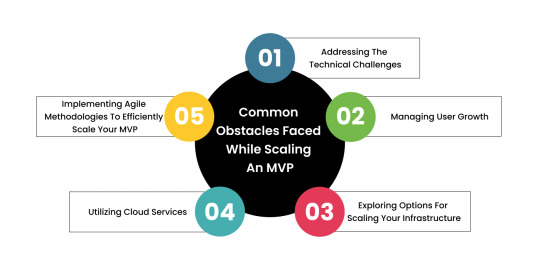
MVP Development Services - Protonshub Technologies
Find the challenges and problems encountered while scaling an MVP, and get the best mvp development solutions from Protonshub.
#mvp development solutions#mvp development services#mvp development company#mvp software development services#mvp development agency#mvp development company in usa#mvp development services in usa#best mvp software development in us#mvp development for startups#saas mvp development#startup mvp development company#mvp app development company#bespoke mvp development services#mvp web development#mvp software development companies#mvp in web development#mvp#mvp development#mvp development usa#mvp development service solution
0 notes
Text
Is Custom Software Development Worth the Investment?
Discover the Long-Term Cost Savings!
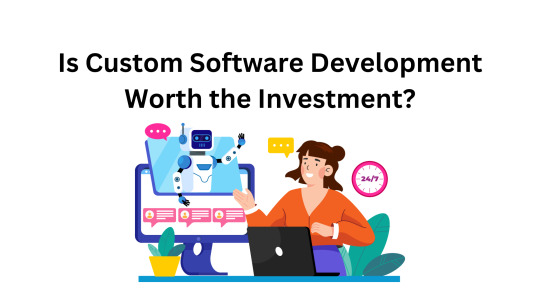
In today's rapidly evolving business environment, software solutions are crucial for streamlining operations, enhancing productivity, and gaining a competitive edge. While off-the-shelf software may seem like a cost-effective option initially, custom software development can offer significant long-term cost savings and a greater return on investment. This article explores the various ways custom software can lead to long-term cost efficiency and why it's a worthwhile investment for businesses seeking sustainable growth.
The Financial Benefits of Custom Software
Custom software development involves creating a solution tailored specifically to your business needs. While it may require a higher upfront investment compared to licensing off-the-shelf software, the long-term benefits can outweigh the initial costs. Here’s how:
Reduced Operational Costs: Companies implementing tailored software can experience operational cost savings of 15–25% within the first three years.
Elimination of Unnecessary Features: Custom software allows businesses to avoid paying for features they don't need, focusing only on essential functionalities.
Scalability: Custom software is designed with scalability in mind, allowing it to adapt as the business grows without requiring significant reinvestment.
Streamlined Workflows: Custom software guarantees streamlined workflows.
Automation: Automating repetitive tasks frees up valuable resources, reducing labor costs and improving efficiency.
Vendor Independence: Open-source software (OSS) reduces costs because it is free to use and customize. Savings also come from vendor independence, community support, and the lack of costly licenses.
Strategies to Maximize Cost Savings
To ensure that your custom software development project delivers the best possible return on investment, consider the following strategies:
Leverage a Minimum Viable Product (MVP): An MVP focuses on core functionalities and allows for scaling up with user feedback, saving time and costs initially.
Focus on Must-Have Features: Prioritize features that deliver the most value to users and align with business goals to avoid unnecessary development costs.
Implement Quality Assurance Protocols: Quality assurance protocols can reduce development charges and help the development team deliver quality software.
Embrace Agile Development: Agile development methodologies promote constant communication and collaboration, allowing for quick adjustments and cost-effective solutions.
Utilize Open-Source Software: Open-source software (OSS) is free to use, customizable, and contains reusable code for cheaper software development.
Choose the Right Technology Stack: Some stacks provide pre-built code and functionalities, reducing the amount of code developers need to write from scratch, thus lessening labor hours and costs.
Consider Cloud Computing: Cloud services can be more affordable than traditional software and hardware solutions.
Maintenance: Technologies known for easy maintenance due to strong community support and thorough documentation, such as React or Angular, also help decrease custom software development costs long-term.
Weighing the Investment
Custom software development offers numerous advantages, including tailored solutions and greater control over intellectual property. However, it's essential to acknowledge the potential challenges:
Higher Upfront Costs: Custom software typically involves a higher initial investment compared to off-the-shelf solutions.
Time-Intensive Development: The development process can be lengthy, requiring careful planning and management.
Conclusion
Custom software development can be a game-changer for businesses seeking long-term cost savings and sustainable growth. By carefully planning your project, focusing on essential features, and implementing effective cost-saving strategies, you can unlock the full potential of custom software and achieve a significant return on your investment.
0 notes
Text
Tech Mind Developers: The Best Software Development Firm for Startups

Starting a new business comes with many challenges, and having the right software solutions is key to success. At Tech Mind Developers, we specialize in helping startups grow with powerful, cost-effective, and scalable software development services. Whether you need a website, a mobile app, or a customized software solution, we are here to turn your vision into reality.
Why Startups Need the Best Software Development Firm?
A startup needs smart digital solutions to streamline operations and compete in the market. Here’s how Tech Mind Developers helps:
Custom Software Solutions: Build software tailored to your business goals.
Scalable Applications: Ensure your software grows with your business.
Affordable Development: Get high-quality solutions within your budget.
Fast Deployment: Get your product to market quickly and efficiently.
Ongoing Support & Maintenance: We ensure smooth performance and updates.
Our Services for Startups
We provide end-to-end software development solutions to help startups succeed:
Website Development: Create a professional and user-friendly website.
Mobile App Development: Reach customers through Android & iOS apps.
E-commerce Solutions: Set up a powerful online store.
Cloud-Based Software: Scale your business with flexible cloud solutions.
MVP Development: Test your idea with a Minimum Viable Product before full launch.
Why Choose Tech Mind Developers?
Experienced in Startup Development: We understand the unique needs of startups.
Client-Centric Approach: We focus on delivering solutions that fit your vision.
Affordable Pricing: High-quality development at the best price.
Trust & Long-Term Partnership: We build lasting relationships with our clients.
Contact Us
If you are a startup looking for the best software development firm, let’s connect!
📞 Phone: +91–7835019421 📧 Email: [email protected] 🌐 Website: https://www.techminddevelopers.com
#bestsoftwaredevelopmentfirmforstartups #techminddevelopers #softwaredevelopment #startupsolutions #customsoftware #affordabledevelopment #scalableapps #digitaltransformation #topsoftwarecompany #itservices #startupsuccess #businessgrowth #besttechpartner #mobileappdevelopment
#bestsoftwaredevelopmentfirmforstartups#techminddevelopers#softwaredevelopment#startupsolutions#customsoftware#affordabledevelopment#scalableapps#digitaltransformation#topsoftwarecompany#itservices#startupsuccess#businessgrowth#besttechpartner#mobileappdevelopment#mobile app development#softwaredesign#websitedevelopment#delhincr#mobileapplications#softwaresolutions#aligarh
0 notes
Text
Micro SaaS: The Smart Way to Build a Profitable Software Business
SaaS has been the goldmine for tech entrepreneurs. However, building the next billion-dollar company is not everyone’s cup of tea. Many entrepreneurs are now resorting to Micro SaaS: a leaner, more focused approach to software businesses that require little investment and are highly profitable. If you are an entrepreneur, developer, or an individual looking for a low-risk business with high reward, then Micro SaaS would be the best option for you. This blog will help you understand what Micro SaaS is, how it is different from traditional SaaS, why you should consider it, and the practical steps to launch your own Micro SaaS business.

What is Micro SaaS?
Micro SaaS: Micro SaaS is really small, highly target SaaS businesses, essentially solving a problem for a niche market. Large numbers of people doing broad work call for huge teams, whereas Micro SaaS businesses are usually solo operations or tiny teams and minimal overhead.
Key Features of Micro SaaS:
Niche Specific-Addresses a smaller, very specific audience, rather than an undifferentiated audience.
Low Cost & Bootstrapped-Typically self-funded and do not require venture capital funding.
Recurring Revenue-Includes the model for predictable and steady revenue flow via a subscription-based business model.
Small Team or Solo Operation-More than one can operate from the shoulders of one founder or small team.
High Profit Margins – With lesser costs, a tiny customer base can generate massive profits.
Remote-Friendly & Scalable – It can be run from anywhere with minimal infrastructure.
Why Should You Build a Micro SaaS Business?
Micro SaaS is gaining popularity for several reasons. If you’re considering starting your own Micro SaaS, here are the key benefits:
1. Low Startup Costs & Minimal Risk You do not need to have millions of funding to get started with a Micro SaaS business. Because the no-code and low-code tool development scene has emerged, even non-tech entrepreneurs can create a product for just a few hundred dollars. 2. Recurring Revenue & High Profitability Because most Micro SaaS businesses operate on a subscription model, you can bank on steady and recurring income. With a small customer base, you can make sustainable profits with little expense.
3. Work from Anywhere Most of the Micro SaaS businesses do not need an office or large infrastructure. You can work from anywhere to have flexibility and independence.
4. Don’t Need a Large Team Most Micro SaaS businesses have solo founders or tiny remote teams, which helps to reduce overhead costs and makes business management easier.
5. High Demand for Niche Solutions They seek solutions that can cater to specialized needs rather than overly complex one-size-fits-all software. Small customer bases are a good idea if you identify a unique problem that you can solve.
How to Build a Micro SaaS Business: Step-by-Step Guide
Step 1: Find a profitable niche
The key to a micro SaaS is to identify a specific problem to be solved. Here’s how:
Scour Reddit, Twitter, and online communities to uncover problems.
Identify missing features in existing SaaS products.
Consider inefficiencies in your own industry
Step 2: Validate Your Idea
But, before building that product, know whether people want to pay for it or not.
Create a landing page with signup form and get an interest barometer.
Talk to potential users in online communities or industry groups.
Run a small paid ad campaign ( $50–100) to test demand.
Pre-sell early access to validate customer interest before development.
Step 3: Build a Minimum Viable Product (MVP)
Don’t overcomplicate it—start small and launch quickly.
Use no-code tools like Bubble, Glide, or Softr if you’re not a developer.
Build a simple web app, Chrome extension, or Slack bot.
Focus on the core problem and add extra features later according to user feedback.
Step 4: Launch & Get Your First Users
After building and making your MVP, get real users to test and refine your product.
Post on niche communities, such as on Reddit, Indie Hackers, Product Hunt.
Use cold outreach: LinkedIn, Twitter, e-mail to reach potential customers.
Provide a free trial or early-bird discount to encourage early adopters.
Utilize SEO through producing relevant content regarding your niche.
Step 5: Optimize & Scale Your Business
After acquiring users, customer retention and business growth will be in focus.
Improve the product based on user feedback.
Test various pricing models, such as monthly vs. yearly and freemium vs. paid.
Automate marketing by email sequences, content marketing, and referral programs.
Plan your long-term strategy—maintain it as a lifestyle or scale further.
Final Thoughts
Micro SaaS is perhaps the best opportunity that has come across for indie entrepreneurs, developers, and side hustlers to create an online business, profitable enough with no significant investment or team. The niche problem solution, recurring revenue, and lean operations allow one to build sustainable, low-risk businesses with a focus on creating financial independence and flexibility.
0 notes
Text
Software Product Development: Turning Ideas into Market-Ready Solutions
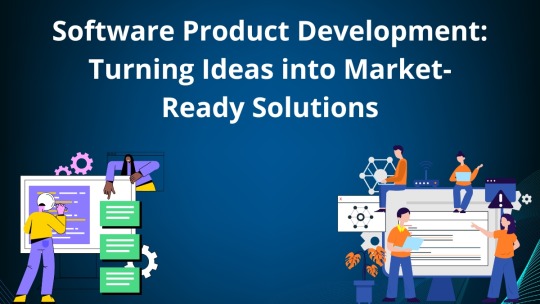
In today’s world, businesses must continuously create to stay ahead. Whether you're a start-up looking to launch a ground breaking product or a fixed enterprise aiming to update your software, partnering with an expert software development company can make all the difference.
From approach to use, product development services make sure that your vision transforms into a strong, scalable, and high-performing digital solution.
What is Software Product Development?

Software product development is a structured process that involves designing, building, testing, and launching software applications tailored to specific business needs.
Unlike off-the-shelf solutions, custom software development gives flexibility, manageability, and improves security to meet unique business needs.
The process follows a well-defined lifecycle that includes ideation, ideal, development, testing, and continuous optimization.
A dedicated development company makes sure that every phase matches with industry best practices and market demands, reducing the risks related to software failure.
Key Stages of Product Development
Successful development services follow a step-by-step approach to make sure smooth performance. Here’s how an experienced product development consulting firm drives innovation:
1. Product Ideation & Strategy
Every successful product starts with an idea, but turning that idea into reality needs thorough planning. Development consulting helps businesses define clear objectives, conduct market research, and validate workability.
This stage involves competitor study, identifying target users, and preparing a planned roadmap to make sure a strong market fit.
2. MVP (Minimum Viable Product) Development
Before investing in a full-scale product, it's key to test the waters. New product development often recommends launching an MVP – a simplified version of the software with key features.
This allows businesses to collect user feedback, identify improvements, and repeat quickly, reducing risks and development costs.
3. Custom Software Development
Unlike generic applications, product engineering focuses on building custom-made solutions that match with business goals. The latest technologies, including AI, IoT, and blockchain, are often repeated to improve use.
4. Product Modernization
Many businesses struggle with old software that hampers efficiency and security
5. Cloud-Based Product Development
With businesses increasingly moving to the cloud, digital product development services stress building scalable, cost-effective, and secure cloud-native applications.
These solutions offer better workability, improve collaboration, and streamlined operations, making them ideal for growing businesses.
6. UI/UX Design for Enhanced User Experience
A well-designed product isn’t just about functionality—it’s about user experience. Product development design services prioritize natural navigation, accessibility, and aesthetics to make sure higher user engagement and care.
A smooth UI/UX design can remarkably impact adoption rates and customer satisfaction.
Why Choose Custom Product Development Over Off-the-Shelf Solutions?
Many businesses face a common difficulty. should they invest in software development or opt for off-the-shelf solutions? Here’s why adapt software is a smarter choice:
Personalization: Custom solutions address specific business needs rather than giving general features.
Scalability: As businesses grow, custom software can easily adapt and expand.
Security: Unlike mass-produced software, custom-built solutions are less dangerous to cyber threats.
Competitive Edge: Unique features help businesses stand out from competitors.
Choosing the Right Product Development Partner
Selecting the right development company is important for success. Here’s what to look for:
Proven Expertise: Experience in providing similar projects with positive client review.
Agile Development Approach: Make sure faster repeats and flexibility in development.
End-to-End Services: From plan to deployment and post-launch support.
Cost-Effectiveness: A balance between reasonable and high-quality development.
Conclusion
In a time where digital transformation is key to success, investing in expert development services can boost business growth. Whether you need new product development services, or product development consulting, IMENSO software can help you turn your ideas into a market-ready, high-performing solution.
0 notes
Text
Top Challenges in Software Development and How to Overcome Them

Software development is a complex process, but it’s also a rewarding one. Whether you’re building a small app or a massive enterprise solution, developers face several common challenges. In this blog, we’ll look at the top challenges in software development and provide practical tips on how to overcome them.
1. Unclear Requirements
Unclear evolving requirements produce one of the toughest setbacks that developers encounter in software design. Such shifting requirements pose significant challenges because they result in confusing circumstances, project delays and user frustration.
How to Overcome It:
Clear Communication: Expectant stakeholders need frequent communications from your team. Also use inquiry to clarify requirements while verifying shared comprehension. To ensure interpretation of requirements and team alignment ask clarification questions.
Document Everything: Record all necessary requirements into a clear document before obtaining approval. The documentation functions as a guide for future reference points that serve purposes of requirement changes and ongoing query management.
Agile Methodology: With Agile organizations gain flexibility throughout development to handle requirement changes while maintaining project control.

2. Time Management and Deadlines
Developing code amidst deadlines presents substantial challenges for maintaininng high quality output. The requirement for rapid project delivery forces developers to rush their work resulting in informally eliminated methods.
How to Overcome It:
Break Tasks into Smaller Chunks: Transform large projects into smaller getting-started pieces that become easier to follow and maintain schedules. The method helps to monitor achievements and keep projects on time.
Prioritize: Start by putting the crucial features into the forefront. A product release only demands optimal performance from the most crucial features in its initial version. The Minimum Viable Product (MVP) methodology lets you start your product early to evolve through subsequent developments.
Use Time Management Tools: Digital tools including Trello, Jira and Asana function as coordinators to maintain order while optimizing task management efficiency for your projects.
3. Code Quality and Bugs
Writing error-free code remains an ongoing difficult task for developers. Program errors along with inadequate code can result in severe problems which cause system collapses and security breaches.
How to Overcome It:
Code Reviews: The team should conduct regular evaluations of code with each other. External review of your work helps identify problems which went unnoticed by your team.
Automated Testing: Automatic testing systems detect software errors before they progress. Selenium together with JUnit and Test Complete represent automated testing solutions for efficient software testing.
Refactoring: You should refactoring your code frequently to maintain coding cleanliness along with increasing efficiency. Regular refactoring of code helps minimize technical debt which results in simplified software maintenance over time.
4. Security Concerns
Data breaches and cyberattacks occur frequently which makes security a critical priority right now. User security risks along with negative impact on your reputation result from software shortcomings in security.
How to Overcome It:
Follow Security Best Practices: When building applications users should always adhere to industry standards outlined by OWASP (Open Web Application Security Project) to ensure security.
Use Encryption: You must encrypt important information to achieve secure storage and protected data movement. Your organization must implement secure protection measures for its moving data and stationary data.
Regular Security Audits: Routine checks of system security together with vulnerability evaluations must be performed. Security evaluations carried out regularly will detect possible threats in advance of their developmental state.
5. Managing Technical Debt
When developers create substandard code to shave off development time their work becomes known as technical debt which results in future difficulties. Developers implement technical debt similarly to borrowing money because quick solutions today result in future payments.
How to Overcome It:
Balance Speed with Quality: Prioritize your deadlines yet mind that you should never compromise your code quality. Develop your code with precision taking time to achieve both high quality standards and maintainability.
Pay Down Technical Debt: Devote regular time to improve and restructure existing code depsite the fact that new tasks fastly arise. Periodic code refining helps stop debt technical issues from growing enough to create more substantial issues in the future.
Use Design Patterns: Applications require a preliminary adoption of design patterns coupled with best practices for future system evolution reduction needs. Early implementation of design patterns combined with best practices helps prevent the necessity of future hasty solutions.
6. Integration Issues
Software applications need to establish connections with additional external systems together with various services or APIs. Unstable integration among systems triggers project delays as well as creates software glitches during development.
How to Overcome It:
Plan for Integration Early: Your project development should begin with integration planning from the start. Early integration planning helps prevent upcoming problems from developing during project execution.
Test Integrations: Prior to product launch users should exhaustively test all integration points. To replace live data with simulated data, you should use mock information for testing.
Document Integrations: Every integration point needs to be documented thoroughly. Clear documentation established at integration points will simplify both maintenance and troubleshooting processes in the future.
7. Team Collaboration and Communication
Development of software represents an effort that cannot succeed through independent action. Development projects need team collaboration among developers alongside designers and project managers to function properly. Preventable communication errors create obstacle paths and problems with execution.
How to Overcome It:
Regular Meetings: You should conduct weekly group meetings which include discussions of workload progress and performance barriers. The practice ensures everyone maintains alignment through each stage.
Use Collaborative Tools: Virtual collaboration tools including Slack Microsoft Teams and Google Meet establish continuous streamlines communication.
Foster a Collaborative Culture: Promote a lifestyle of open communication, in which group individuals can easily enjoy thoughts and ask for assist in need.
8. Keeping Up with New Technologies
The technological field undergoes constant changes whereby new development tools together with programming languages and frameworks emerge frequently. The continuous flow of technological progress creates overwhelming challenges to stayed informed.

How to Overcome It:
Continuous Learning: Devote time for both learning and investigating forthcoming technologies by participating in workshops or taking online courses and attending tech events. For educating yourself explore online learning programs while joining technology-focused workshops and meetups.
Evaluate Tools Carefully: Before using new technology evaluate if it matches your project requirements as well as future development plans.
Stay Informed: Staying current with software development trends requires reading tech blogs alongside podcast listening and article consumption.
Conclusion
Software development presents challenges yet proper advance planning and strategic implementation enables you to deal with them effectively. The successful development of great software depends on clear communication along with effective time management and both code quality and security practices. Your software development process will succeed when you adapt to challenges while continuously learning and working together with your team.
Addressing these development challenges directly leads to more efficient project cycles which results in better software solutions for end-users.
0 notes